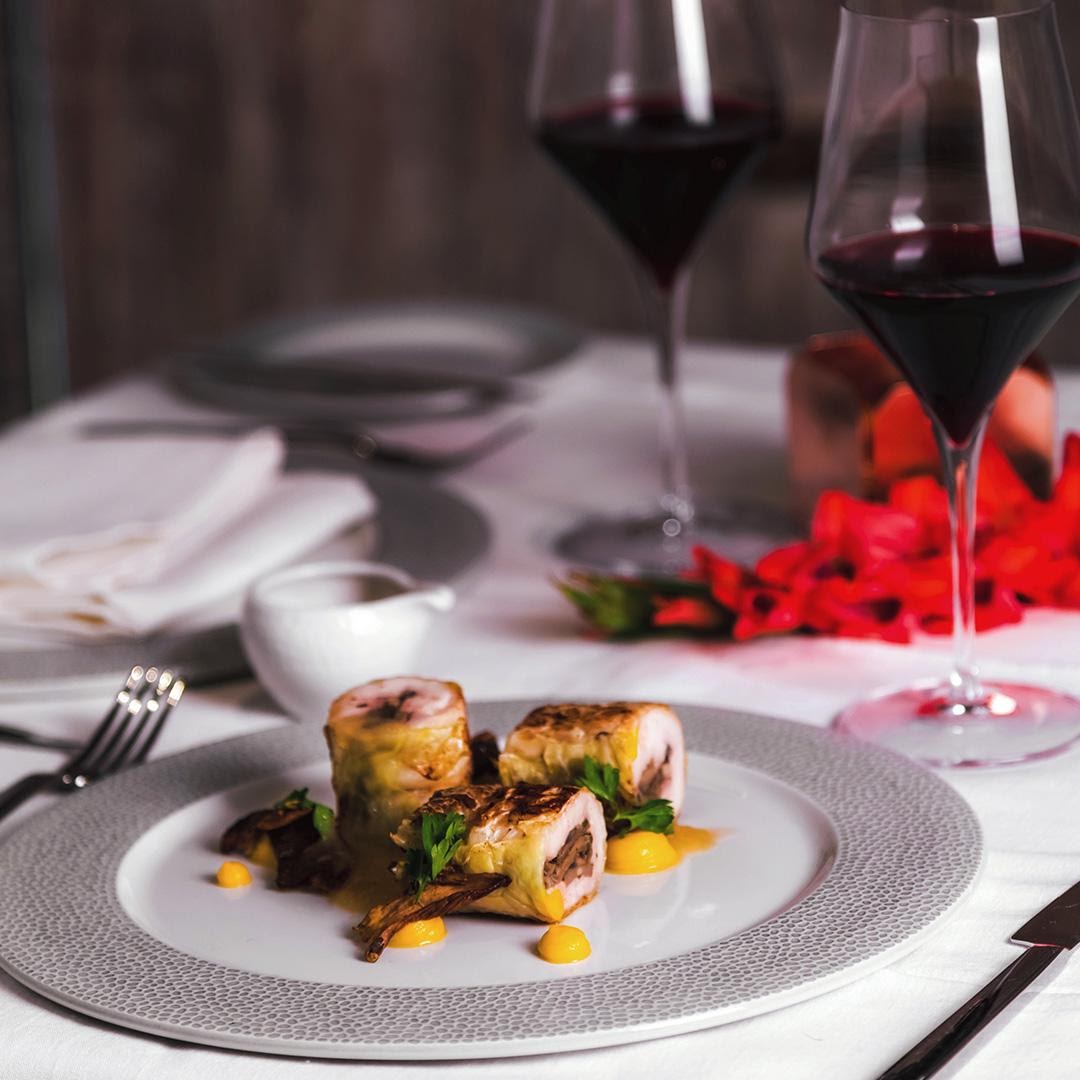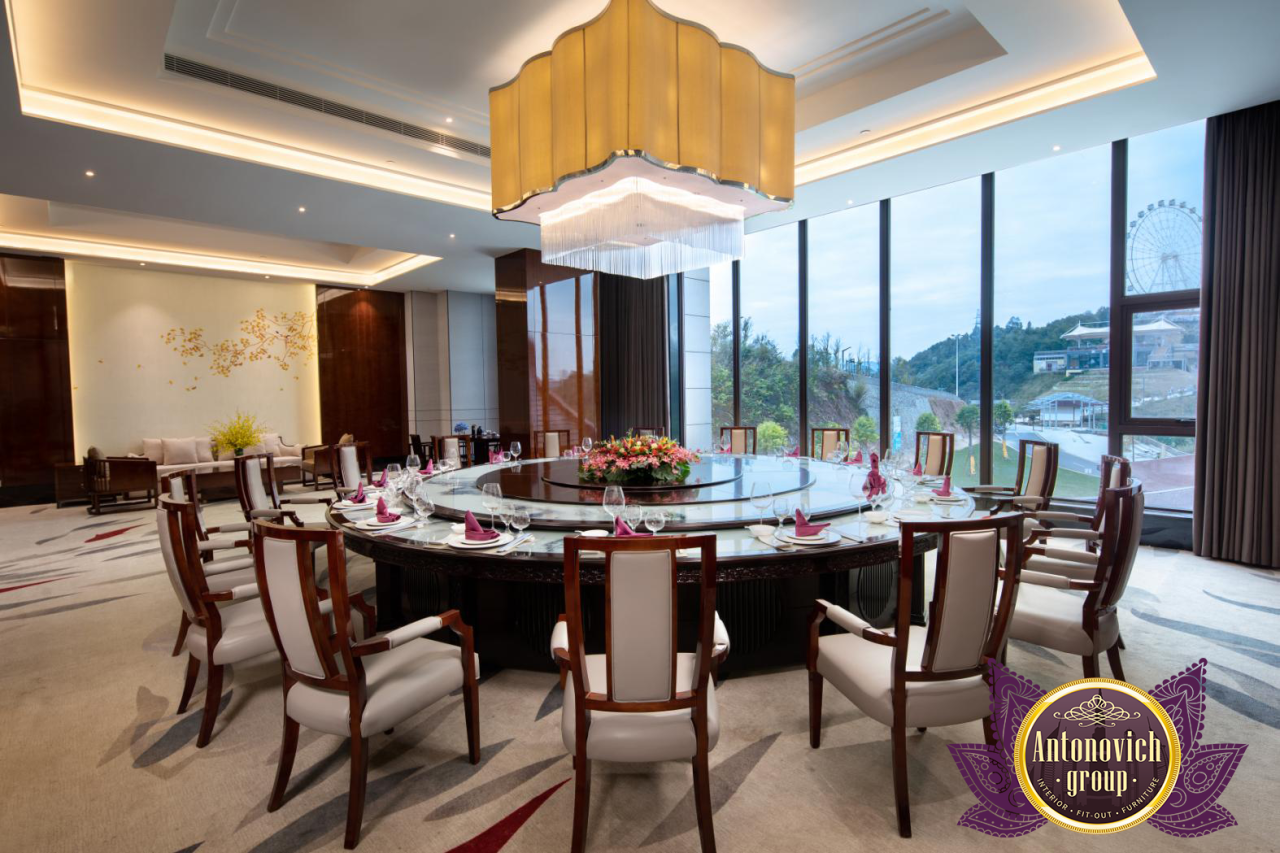Luxury Hotels That Offer Unique Dining Experiences
Luxury hotels that offer unique dining experiences redefine the art of gastronomy, transforming meals into unforgettable journeys. From breathtaking rooftop views to immersive thematic events, these establishments go beyond standard dining, inviting guests to engage with food in innovative ways. With renowned chefs at the helm and a focus on local ingredients, each dining experience is crafted to not only satisfy the palate but also to educate and inspire.
Imagine savoring a dish prepared with ingredients sourced directly from nearby farms while enjoying the mesmerizing ambiance of your surroundings. This is the essence of luxury dining today—a blend of culinary excellence and cultural enrichment that captivates all the senses.
Unique Dining Concepts in Luxury Hotels

Luxury hotels are redefining the culinary landscape by introducing unique dining experiences that tantalize the taste buds and provide unforgettable memories. From themed restaurants that transport guests to different cultures to innovative dining concepts that blend gastronomy with entertainment, these establishments are at the forefront of culinary creativity. This evolution of dining experiences reflects a growing trend where luxury is not just about opulence but also about immersive and engaging culinary journeys.
Many luxury hotels are adopting innovative dining themes that reflect local culture, sustainability, and guest interaction. Among these, rooftop dining experiences stand out for their breathtaking views and sophisticated ambiance. These venues often combine exquisite cuisine with sweeping panoramas of city skylines or natural landscapes, providing a dining experience that goes beyond just a meal. Additionally, interactive dining options engage guests in the culinary process, allowing them to become part of the gastronomic adventure, fostering a deeper connection with the food they enjoy.
Rooftop Dining Experiences with Unique Views
Rooftop dining has become a hallmark of luxury hotels, offering not just meals but experiences enriched by stunning visuals. The combination of gourmet food and captivating views creates a memorable ambiance that attracts both hotel guests and local patrons.
Some notable examples of luxury hotels with remarkable rooftop dining include:
- The Standard, High Line, New York: Known for its vibrant atmosphere, the rooftop bar and restaurant, Le Bain, provides stunning views of the Manhattan skyline and the Hudson River. Patrons enjoy a menu featuring French-inspired dishes along with expertly crafted cocktails.
- Banyan Tree, Bangkok: The hotel’s Vertigo and Moon Bar offers a breathtaking dining experience on the 61st floor, with a panoramic view of the city. Guests can indulge in a range of international dishes while enjoying the glittering skyline at night.
- Shangri-La Hotel, Sydney: Offering unparalleled views of the Sydney Harbour and the iconic Opera House, the Altitude Restaurant features a modern Australian menu complemented by an extensive wine list, creating a dining experience that celebrates the beauty of its surroundings.
These rooftop venues not only elevate the dining experience through their exceptional views but also enhance the culinary offerings with unique, locally-inspired dishes.
Interactive Dining Options in Luxury Hotels
Interactive dining takes the culinary experience to new heights by inviting guests to engage with the food and the chefs. This approach fosters a sense of community while allowing diners to learn more about the culinary arts.
Several luxury hotels are pioneering interactive dining experiences, including:
- Gourmet Cooking Classes at Four Seasons: Many Four Seasons properties offer guests hands-on cooking classes led by professional chefs. Participants learn to prepare signature dishes while gaining insights into local ingredients and cooking techniques.
- The Chef’s Table at The Ritz-Carlton: This exclusive dining experience allows guests to interact directly with the chef in a private kitchen setting, observing the cooking process while enjoying a curated multi-course meal paired with exquisite wines.
- Teppanyaki Dining at Benihana: In various luxury hotels, guests experience the excitement of dining at a teppanyaki grill, where skilled chefs prepare meals in front of diners, incorporating entertainment and culinary artistry in a single performance.
These interactive dining options not only captivate guests but also enrich their understanding of different cuisines, making for a memorable and educational gastronomic journey.
Signature Chefs and Culinary Teams
Luxury hotels around the globe have increasingly recognized the power of exceptional dining experiences to enhance guest satisfaction. By collaborating with renowned chefs, these establishments not only elevate their culinary offerings but also create a memorable atmosphere that reflects their brand’s commitment to excellence. The presence of culinary experts allows hotels to appeal to discerning palates while providing guests with unique gastronomic adventures that go beyond mere sustenance.
The impact of having renowned chefs and their culinary teams extends far beyond the menu. Signature dishes crafted by these culinary maestros often become a focal point for travelers seeking to indulge in exquisite flavors and presentations. A well-curated culinary team can transform a hotel’s dining scene, creating an immersive experience that captivates guests and leaves a lasting impression. Hotels invest time and resources into carefully selecting their culinary experts, ensuring that each chef brings a unique perspective and skill set to the table, thus enhancing the overall dining options available.
Luxury Hotels Featuring Renowned Chefs
Several luxury hotels stand out for their collaboration with acclaimed chefs, offering signature dishes that attract gourmets from around the world. The following examples illustrate how these culinary partnerships can elevate the dining experience:
- The Dorchester, London: Iconic chef Alain Ducasse leads the culinary team at this prestigious hotel, featuring dishes such as the famous ‘Ducasse Style Lobster’ that showcases delicate flavors and impeccable presentation.
- Waldorf Astoria, New York: Renowned chef Jean-Georges Vongerichten elevates the dining experience at this landmark hotel with his signature dish, ‘Miso Glazed Black Cod,’ known for its umami-rich flavors and exceptional execution.
- Four Seasons Resort, Maui: Under the guidance of chef Chris Cracchiolo, this resort offers an unforgettable dish, ‘Kona Lobster with Miso Butter,’ combining fresh local ingredients with a touch of Asian influence.
- Ritz-Carlton, Tokyo: Michelin-starred chef Motohiro Aikawa crafts an exquisite dining experience with his signature ‘Sushi Omakase,’ emphasizing precision, quality, and artistry in each bite.
The importance of having such distinguished culinary experts on-site cannot be overstated. Their expertise creates a ripple effect throughout the hotel, enhancing the guest experience and setting a benchmark for excellence that resonates with visitors. Moreover, these culinary leaders often inspire and mentor up-and-coming chefs within the hotel, fostering a culture of innovation and creativity in the kitchen. The collaborative atmosphere encourages culinary teams to experiment, adapt, and refine their dishes, ensuring an ever-evolving menu that reflects both local influences and global trends.
The curation of culinary teams in luxury hotels is a strategic process that involves selecting individuals who not only possess exceptional skills but also align with the hotel’s brand ethos. By fostering a collaborative environment and encouraging creativity, hotels can ensure their dining offerings remain fresh, appealing, and reflective of the latest culinary trends. The synergy between renowned chefs and their teams is what ultimately crafts memorable dining experiences that guests cherish long after their stay.
Farm-to-Table Dining Experiences
Luxury hotels around the world are increasingly embracing farm-to-table dining experiences that not only elevate guest satisfaction but also promote sustainability and local agriculture. This culinary approach emphasizes the importance of sourcing ingredients directly from local farms, fostering a direct connection between consumers and producers. By prioritizing fresh, seasonal produce, luxury hotels create a unique dining experience that is as much about flavor as it is about ethical sourcing.
Implementing farm-to-table practices involves a comprehensive approach to the supply chain, where luxury hotels often establish partnerships with local farmers and artisans. This ensures that their restaurants receive the freshest ingredients, often harvested just hours before they reach the kitchen. Such practices lead to a reduced carbon footprint, enhanced flavor profiles in dishes, and support for the local economy, ultimately creating a meaningful dining experience for guests.
Benefits of Sourcing Local Ingredients
The significance of sourcing local ingredients for hotel restaurants cannot be understated, as it offers numerous benefits that enhance both the dining experience and community well-being.
-
Enhanced Freshness:
Ingredients sourced from local farms are often harvested at peak ripeness, providing superior flavor and nutritional value.
-
Support for Local Economies:
By purchasing from local producers, hotels help stimulate the local economy, creating jobs and fostering community development.
-
Seasonal Menus:
Local sourcing allows chefs to design menus that reflect seasonal availability, promoting creativity and variety in dining options.
-
Reduced Environmental Impact:
Minimizing transportation distances decreases carbon emissions, contributing to a more sustainable food system.
-
Strengthening Community Ties:
Collaborating with local farmers fosters relationships, enhancing the hotel’s reputation as a community-oriented establishment.
Comparison of Luxury Hotels Engaging in Sustainable Dining Practices
Several luxury hotels are setting exemplary standards in sustainable dining through their farm-to-table initiatives. These establishments not only emphasize quality cuisine but also demonstrate a commitment to environmental responsibility.
- The Ritz-Carlton, Bachelor Gulch (Colorado, USA): This hotel operates its own garden and partners with local farms, offering a menu that highlights regional ingredients, including game meats and foraged plants.
- Post Ranch Inn (California, USA): With breathtaking views of the Big Sur coast, this hotel emphasizes organic and locally sourced ingredients in its fine dining offerings, with a focus on sustainability.
- Hotel Bel-Air (California, USA): The hotel features a garden that supplies much of the produce for its restaurant, emphasizing both freshness and sustainability in its culinary offerings.
- Alila Villas Uluwatu (Bali, Indonesia): Known for its commitment to local sourcing, this hotel boasts a culinary team that collaborates closely with local farms, ensuring a menu that showcases Balinese flavors and ingredients.
- Rosewood Hotel Georgia (Vancouver, Canada): This establishment prioritizes seasonal, local ingredients in its restaurants, with partnerships that highlight British Columbia’s rich agricultural landscape.
Through these practices, luxury hotels not only enhance their culinary offerings but also contribute to a more sustainable food future.
Thematic Dining Events and Experiences: Luxury Hotels That Offer Unique Dining Experiences

Thematic dining events have become a hallmark of luxury hotels, transforming ordinary meals into extraordinary culinary journeys. These events not only elevate the dining experience but also provide guests with unique opportunities to engage with different cultures, cuisines, and seasonal festivities.
Luxury hotels meticulously curate thematic dining experiences throughout the year, ensuring that each occasion is a celebration of creativity, flavor, and ambiance. The seasonal menus are crafted to highlight specific occasions, featuring ingredients that resonate with the themes being celebrated. The following list showcases some of the most captivating thematic dining events that luxury hotels host annually.
Annual Thematic Dining Events
Thematic dining events are designed to immerse guests in a specific cultural or seasonal experience, often complemented by stunning decor and tailored entertainment. Here are some notable examples:
- Harvest Festival Feast: Celebrated in autumn, this event features a menu rich in seasonal produce, often sourced from local farms, creating a true farm-to-table dining experience.
- Valentine’s Day Romantic Dinner: A specially curated menu with aphrodisiac ingredients, accompanied by candlelit settings, live music, and personalized service to create an intimate atmosphere.
- International Cuisine Week: A week-long celebration featuring rotating menus that spotlight different cultures, allowing guests to experience diverse culinary traditions and flavors.
- Winter Wonderland Gala: A festive dining event during the holiday season, showcasing a lavish buffet filled with seasonal delicacies, hot beverages, and beautifully crafted desserts, complemented by festive decor.
- Summer Seafood Soirée: A beach-themed dining experience featuring fresh seafood dishes, tropical cocktails, and an ocean-inspired ambiance that transports guests to a coastal paradise.
The uniqueness of each thematic event often lies in the seasonal menus that luxury hotels create specifically for these occasions. These menus not only incorporate seasonal ingredients but also reflect the significance of the events being celebrated.
Seasonal Menus for Special Occasions
During thematic events, luxury hotels often introduce exclusive seasonal menus that elevate the dining experience. These menus typically feature locally sourced ingredients and signature dishes that align with the theme.
- Spring Awakening Menu: Highlighting fresh vegetables, herbs, and spring proteins, this menu celebrates the season of renewal with vibrant dishes such as asparagus tart and lamb with mint chimichurri.
- Summer Harvest Menu: Featuring bright flavors and refreshing ingredients, dishes may include heirloom tomato salads, grilled peaches, and seafood ceviche, perfect for summer gatherings.
- Autumn Bounty Menu: Emphasizing rich flavors associated with fall, this menu often includes butternut squash soup, roasted root vegetables, and apple desserts that evoke the essence of the harvest.
- Winter Comfort Menu: A selection of hearty dishes such as braised short ribs, root vegetable gratin, and decadent chocolate desserts designed to warm guests during the colder months.
Immersive Dining Experiences through Decor and Ambiance
Creating an immersive dining experience is essential for luxury hotels. The decor and ambiance play a crucial role in enhancing the thematic dining events, giving guests a fully realized experience.
Thematic decor often aligns with the culinary themes and can include:
- Live Entertainment: Music, dance, or theatrical performances that reflect the cultural theme of the meal, enhancing the overall atmosphere.
- Table Settings: Customized table arrangements with elements that mirror the theme, such as floral arrangements, themed dishware, and ambient lighting.
- Visual Displays: Art installations or projections that correspond with the theme, adding depth and interest to the dining experience.
- Interactive Stations: Live cooking stations or mixology bars where guests can engage directly with chefs and mixologists, further immersing them in the experience.
The combination of exceptional cuisine, thematic decor, and immersive experiences ensure that guests not only enjoy their meals but also create lasting memories during their stay at luxury hotels.
Cultural Culinary Journeys

Luxury hotels are increasingly embracing local culture as an integral part of their dining experiences, allowing guests to immerse themselves in the rich tapestry of regional traditions and flavors. These culinary journeys not only enhance the gastronomic experience but also provide insights into the lifestyle and heritage of the destination, making each meal a memorable exploration of culture.
One effective method luxury hotels utilize to incorporate local culture into dining is through the offering of regional cuisine and cultural cooking classes. These experiences often include hands-on participation, allowing guests to engage with native chefs and learn about the history and significance of the dishes they prepare. Engaging with local ingredients, traditional cooking techniques, and culinary storytelling brings the cultural context to life.
Regional Cuisine and Cooking Classes
Luxury hotels worldwide curate unique dining experiences that reflect the culinary heritage of their regions. Below are notable examples of hotels that excel in this area:
- Rosewood San Miguel de Allende: This stunning hotel offers guests the chance to participate in cooking classes that highlight traditional Mexican recipes. Guests are guided through the preparation of local favorites, learning about the origin and cultural significance of each dish.
- Four Seasons Resort Bali at Sayan: Guests can take part in Balinese cooking classes that focus on organic ingredients harvested from the resort’s own gardens. The experience includes a visit to local markets, providing deeper insights into Balinese culinary traditions.
- Hotel Bel-Air, Los Angeles: The hotel hosts exclusive culinary events featuring celebrated chefs who incorporate Southern Californian flavors into their menus. Guests can attend workshops that focus on seasonal produce and local culinary styles.
These culinary experiences enrich guests’ understanding of local traditions by not only providing a meal but also a narrative that connects them to the community. Through these journeys, participants gain practical skills and cultural knowledge, creating lasting memories that extend beyond their stay.
“The art of cooking is closely tied to the culture of a place; it tells the story of its people, history, and environment.”
Through these immersive experiences, luxury hotels elevate dining from a mere necessity to an enlightening journey through the heart of local culture.
Exclusive Dining Venues Within Hotels
Luxury hotels are redefining the dining experience by offering exclusive venues that are not just places to eat, but immersive environments where food and ambiance intertwine seamlessly. These unique dining spots often feature breathtaking views, innovative designs, and exceptional service, creating unforgettable moments for guests. From underwater restaurants to tree-top dining, these exclusive venues elevate culinary experiences to new heights.
The architectural design and strategic locations of these dining venues play a crucial role in enhancing the overall experience. They often incorporate local culture and nature, fostering a deep connection between the diner and the environment. The exclusive nature of these venues often allows for personalized dining services, ensuring each guest feels special and catered to.
Unique Dining Concepts in Exclusive Venues
Many luxury hotels around the world feature dining venues that stand out due to their unique settings and concepts. Below are notable examples that exemplify creativity and luxury:
- Underwater Dining: At the Conrad Maldives Rangali Island, the Ithaa Undersea Restaurant offers guests a chance to dine 16 feet below sea level, surrounded by vibrant marine life. The spectacular views and exquisite seafood create a one-of-a-kind dining experience.
- Tree-Top Dining: The Treepod Dining at Soneva Kiri in Thailand allows guests to enjoy gourmet meals served in private treehouses, accessed by zip lines, with views of the lush forest canopy. This unique setting combines adventure with fine dining.
- Sky-High Dining: The Burj Al Arab in Dubai features Al Muntaha, a restaurant located 200 meters above sea level, offering panoramic views of the Arabian Gulf. The opulent decor and high-end European cuisine provide a luxurious experience.
- Private Dining Rooms: The Peninsula Paris offers exclusive dining experiences in its private dining rooms, where guests can enjoy tailored menus crafted by Michelin-starred chefs. The intimate setting and personalized service make every meal memorable.
- Desert Dining: At the Amangiri Resort in Utah, guests can enjoy a unique dining experience under the stars in the middle of the desert, with a menu emphasizing local flavors and seasonal ingredients, all while surrounded by stunning rock formations.
These venues not only provide exceptional food but also create an ambiance that transforms each meal into a special occasion. The thoughtful integration of design, location, and service ensures that guests leave with lasting memories of their dining experiences.
Wine and Dine Experiences
The fusion of exquisite cuisine and fine wine is a hallmark of luxury dining, elevating meals into multi-sensory experiences that tantalize both the palate and the spirit. Luxury hotels recognize the importance of such pairings, curating wine selections that complement their culinary offerings and enhance the overall dining experience for guests. A well-chosen wine can transform a dish, accentuating flavors and introducing new dimensions to the meal.
In the realm of luxury accommodations, the presence of in-house sommeliers plays a pivotal role in creating memorable wine and dine experiences. These wine experts not only curate extensive and diverse wine lists but also engage with guests, offering personalized recommendations based on individual tastes and preferences. Their knowledge extends beyond mere selections; they often share insights about the origins, tasting notes, and ideal pairings, further enriching the guest experience.
In-House Sommeliers and Their Role
Sommeliers serve as the bridge between the guest and the extensive world of wine, drawing from their expertise to enhance dining experiences at luxury hotels. The role of a sommelier encompasses several key elements:
- Personalized Recommendations: Sommeliers assess guests’ preferences, suggesting wine pairings that complement the meal while also catering to individual tastes.
- Wine Education: By sharing knowledge about wine origins, varietals, and production methods, sommeliers add an educational component to the dining experience.
- Curation of Wine Lists: They meticulously curate the hotel’s wine list, selecting options that align with the culinary vision and guest expectations.
- Tasting Events: Many sommeliers host wine tastings that allow guests to explore various wines, enhancing their appreciation and understanding.
Unique Wine-Related Events
Luxury hotels often curate unique wine-related events that allow guests to indulge in the world of wine and enhance their culinary experiences. These events include:
- Wine Tastings: Exclusive tastings featuring curated selections from renowned vineyards, led by expert sommeliers who guide guests through the tasting process.
- Winery Tours: Organized excursions to local vineyards, providing guests with a firsthand experience of winemaking and the opportunity to taste wines straight from the source.
- Themed Wine Dinners: Special dining events where each course is paired with a carefully selected wine, often focusing on a specific region or varietal.
- Wine Pairing Workshops: Interactive sessions where guests learn the art of pairing wine with food, often culminating in a communal dining experience featuring their culinary creations.
The integration of wine and dining experiences in luxury hotels not only highlights the sophistication of their culinary offerings but also provides guests with the opportunity to deepen their appreciation for wine. With dedicated sommeliers and thoughtfully curated events, these hotels elevate the dining experience to new heights, making each meal an unforgettable journey into the world of fine wine.
Guest Feedback and Reviews on Dining Experiences
Luxury hotels are increasingly being reviewed for their dining experiences, with guests sharing insights about their culinary adventures. Feedback often highlights the quality of food, service, ambiance, and overall uniqueness of the dining experience. This information is vital for hotels as it helps them tailor their offerings to suit guest preferences and expectations.
Guest reviews reveal several common themes regarding unique dining offerings at luxury hotels. Guests frequently comment on the creativity of menus, the freshness of ingredients, and the presentation of dishes. Such feedback provides hotel management with essential data to refine their culinary approaches. The hotels that excel in adapting to guest feedback often see improved satisfaction and loyalty.
Common Themes in Guest Feedback, Luxury hotels that offer unique dining experiences
Guest reviews often contain similar sentiments related to dining experiences in luxury hotels. By analyzing this feedback, several themes emerge that reflect guest expectations and desires.
-
Quality of Ingredients:
Guests consistently emphasize the importance of fresh, high-quality ingredients that enhance the overall dining experience.
-
Service Excellence:
Attentive and knowledgeable staff are frequently praised, with guests noting that exceptional service elevates their dining experience significantly.
-
Unique Culinary Concepts:
Many guests appreciate innovative and themed dining concepts, which provide memorable experiences beyond standard fare.
-
Atmosphere and Ambiance:
The dining environment plays a crucial role; guests often highlight how the setting enhances their overall enjoyment of the meal.
-
Personalized Experiences:
Customization options, such as tailored menus for dietary restrictions, receive positive mentions from guests seeking a more personalized touch.
Adaptation Based on Guest Feedback
Luxury hotels actively use guest feedback to refine their dining experiences. By paying close attention to reviews and comments, management can identify trends and areas for improvement.
Hotels adapt their offerings through various methods, such as:
-
Menu Adjustments:
Many hotels update their menus seasonally based on guest feedback and ingredient availability, ensuring that they provide fresh and appealing options.
-
Staff Training Programs:
Implementing training programs for staff to enhance service quality and knowledge is common, ensuring that guests receive an exceptional dining experience.
-
Special Events and Promotions:
Responding to guest requests for special dining events or themed nights, hotels often incorporate these suggestions into their promotional strategies.
-
Guest Surveys:
Regularly conducting surveys allows hotels to gather direct feedback from diners, enabling them to make informed decisions about menu changes and service enhancements.
-
Collaborations with Local Chefs:
Engaging local chefs for unique dining events or menu items not only supports the community but also appeals to guests looking for authentic culinary experiences.








